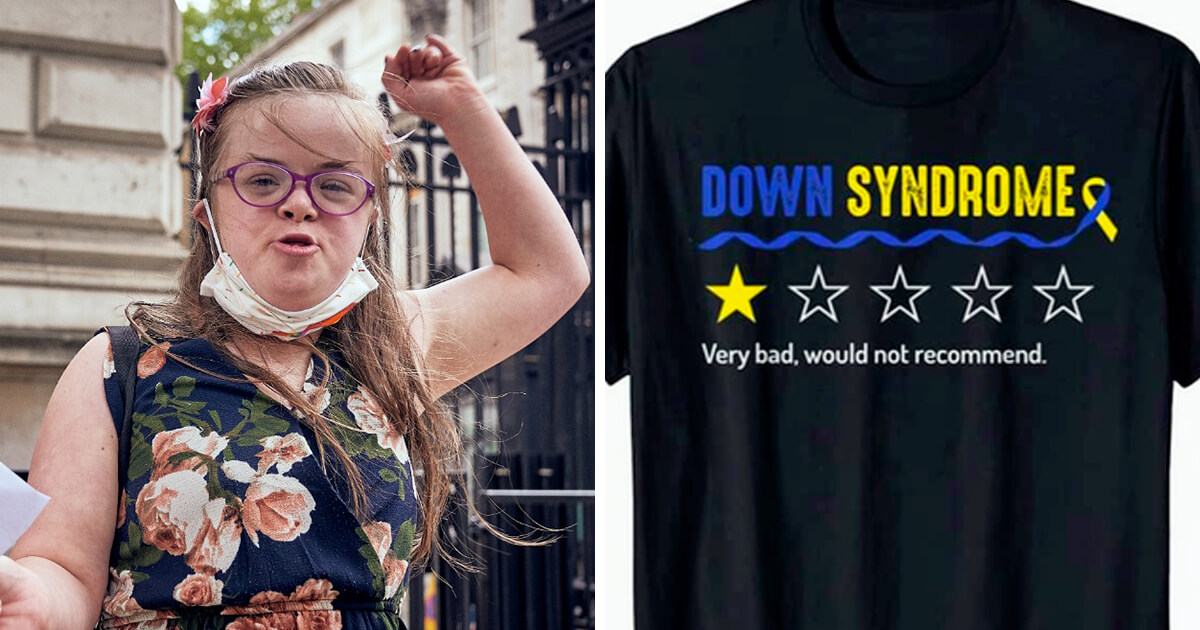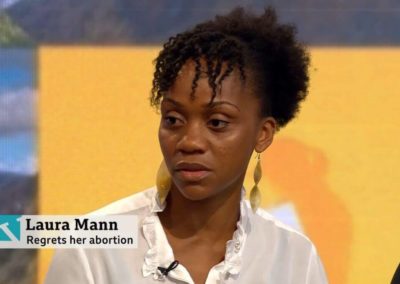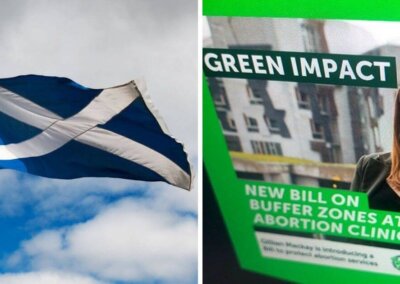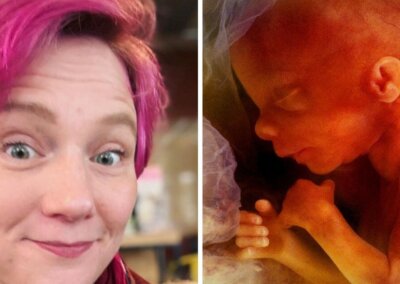Heidi Carter, who has Down’s syndrome and is challenging the UK’s discriminatory abortion law, has spoken out against that clothes sold on Amazon with hateful slogans against the condition are offensive make her feel upset.
It comes after the online giant was caught listing and selling t-shirts that say “Let’s make Down’s syndrome extinct!”, for the second time this in one year.
Speaking to Victoria Derbyshire on the BBC, Heidi revealed how upsetting it was for her when she first saw the offensive clothing.
The recently married 25-year-old said: “I don’t like people saying mean things about me… Also the reason why it’s very offensive is because it hurts my husband as well. I love my husband, so much!”
‘Hate speech’
Heidi’s mother Liz Crowter, who was also interviewed by the BBC said that Down’s syndrome is just one extra chromosome and not something that needs to be eradicated.
She said the t-shirts were “hate speech against people with Down’s syndrome.”
Giving an example of one of the t-shirts Liz said: “There’s another one where it’s a take on an Amazon review site where it says: ‘Down’s syndrome, very bad’ and then five stars. Obviously, only the one star is coloured in. So, they’re saying people with Down’s syndrome are only one star, which, obviously, again is hate speech and deeply upsetting and offensive.”
The Coventry-based mother said she was fed up with Amazon for allowing the offensive clothing back on the website and criticised them for not protecting disability in its policy on hate speech while protecting most other characteristics.
40,000 sign petition against ‘hatewear’
Over 40,000 people have now signed a petition calling on Amazon to do more to help the Down’s syndrome community fight against hate crime.
Actress Sally Phillips, whose oldest child, Olly, has the condition, is among the signatories of the Change.org petition.
She criticised Amazon for selling Down’s syndrome “hatewear” t-shirts, telling The Times: “Eugenic ideas are really taking hold — the idea that there is this subclass of humans and it is better we get rid of them. If you have a world view in which you regard academic intelligence or money-making possibilities as the ultimate goal… then you feel perfectly justified in saying these things.”
She added: “It would break my heart if Olly saw anyone wearing those T-shirts.”
Heidi’s landmark case
Earlier this year, Heidi launched a landmark case against the UK Government over current abortion legislation that singles out babies with disabilities, allowing abortion right through to birth for conditions including Down’s syndrome, cleft lip and club foot.
Heidi’s legal challenge has generated widespread support from those with first-hand experience of Down’s syndrome, pro-life campaigners, disability advocates and more.
Over 5,000,000 people have watched Heidi tell Channel 5 the current law is “deeply offensive” and many more have seen her tell the BBC’s Victoria Derbyshire programme that the current law makes her feel “unloved and unwanted”.
#ImWithHeidi
Heidi’s campaign has been shared tens of thousands of times on social media, with people adding #ImWithHeidi to their posts.
She has now been joined in her legal fight against discriminatory disability-selective abortion by Máire Lea-Wilson, whose one-year-old son, Aidan, has Down’s syndrome.
Máire said she was encouraged in hospital to abort Aidan when a scan at 34-weeks revealed he had the condition.
Recalling her experience, she told Sky News: “I felt like the assumption was that we would abort our baby.”
The mother of two added: “I have two sons and I love and value them equally and I think it seems really wrong that the law doesn’t value them equally.”
New prenatal testing has resulted in increased abortion numbers
The introduction of new prenatal screening tests has been linked to an increase in the number of Down’s syndrome babies aborted in the UK and around the world.
Figures published last year show that the number of babies born with Down’s syndrome in the UK has dropped by 30% in NHS hospitals that have introduced the new non-invasive prenatal tests.
The figures prompted Down’s syndrome advocates to ask the Government to halt the roll-out of the new tests and undertake an inquiry into the impact that the tests are having on the birth numbers of babies with Down’s syndrome.
However, their pleas appear to have fallen on deaf ears, as the Government recently announced that it will be proceeding with the procurement and rollout of a nationwide prenatal testing scheme for Down’s syndrome – something which will likely lead to an increase of babies with the condition being aborted.
Additionally, The Department of Health has previously admitted that no assessment was made of the impact that the roll-out of the new tests will have on the lives of people with the condition.










